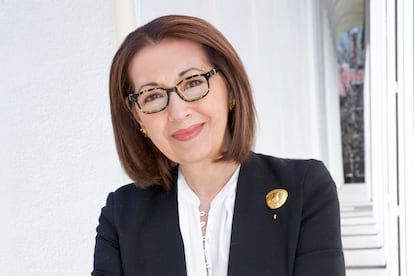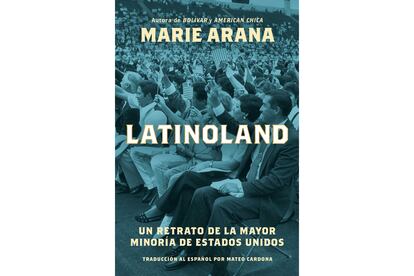Marie Arana: ‘I am building a monument to Latinos and every book I publish is a brick’
‘Latinoland’ is one of The New Yorker’s 12 must-read books of the year


Latinoland is an ambitious history of Latinos that dismantles entrenched stereotypes and offers a narrative of empowerment. Throughout its more than 600 pages, it lays out the Latino community’s potential for success, helps resolve identity crises, and transforms the way Latinos are perceived and treated by society.
This is 75-year-old Peruvian author Marie Arana’s sixth book. She is also an editor at The Washington Post and the inaugural literary director of the Library of Congress. Her work has been widely acclaimed by critics and the public, and she has accumulated awards, including the Los Angeles Times Book Prize (2014), while being shortlisted for the National Book Award and the John Sargent Prize (2001). Having emigrated with her family to New York when she was only nine years old with her Peruvian father and American mother, Arana’s work is just one example of the brilliant contributions of America’s migrant population, which struggles with the rootlessness that comes with a dual identity.
Question: What led you to write Latinoland?
Answer. When I was 38 and working at The Washington Post, I was asked for the first time about my homeland and I realized that I had completely forgotten the little girl I had left behind in Peru. That encouraged me to write my memoir, American Chica. Then I realized that I needed to explain who we Latinos were, to tell our story, and I published two novels. From there I moved on to a biography of Bolívar. And finally I wrote the Silver, Sword and Stone stories. I mean, I went from telling my personal history to narrating the collective history.
Latin America has been the focus of all my work for 25 years, after I realized that the U.S. hardly knows anything about its neighbors to the south. A prime example of this was when [former President Ronald] Reagan came back from Latin America saying, “There are some little countries there and they are all different.” The U.S. has the largest Spanish-speaking population in the world after Mexico. I needed to explain who we are. I am building a monument to Latinos and every book I publish is a brick.
Q. How long did it take you to write it?
A. About two years. I had to quit my job as literary director of the Library of Congress in order to devote myself entirely to writing and researching. I interviewed 247 people.
Q. And have you been able to understand what Latinos want?
A. They want three things. First and foremost, they want economic progress. That’s what the Democratic Party has yet to understand. Jobs are the number one priority, above inclusion. The middle and lower classes have up to three jobs at the same time. Then there is the need for security, and finally education so that their children can be part of a thriving economic system. I have interviewed people who were doctors in Bolivia and became nurses here, or who were teachers in Guatemala and are domestic workers here. They tolerate this change to give their children a chance to do what they want.
Q. You point out in your book that this explains the Latino vote for Donald Trump.
A. Exactly. But it is contradictory at the same time because it might mean deportations. There are organizations that try to reassure immigrants that if they have not committed any criminal act they will not be deported, but in fact we have no guarantee of this. And the situation is cause for concern. If Trump decides to make things difficult for DACA children, scare the U.S. Latino population and sever the relationship with Mexico, there will be a noticeable impact on the country. It is important to make the border secure, but reducing the Latino population in the U.S. will be a big mistake. The Administration has already stated that there are many unnecessary projects that are going to be scrapped and I am afraid that this will affect the construction of the first American Latino National Museum, which is already underway. I think there is a lot to say about our invisible population: 65 million invisible people. And I’m concerned that we’re not going to get the chance.

Q. What role do Latinos play in U.S. society?
A. They are a huge engine for progress, with enormous potential as a market and also as producers. Latinos are the biggest force in small business, the potential for growth is huge. I go to conferences all the time evaluating the economic power that Latinos represent and it is extraordinary. Aside from the technology sector, most corporations will soon be dependent on Latino workers. Given this reality, not having Latinos in boardrooms and leadership positions is unwise.
Q. You write that Sandra Cisneros moved from Texas to San Miguel de Allende because she felt she was not at home [in the U.S.] and that she had to understand her multiplicity, the kaleidoscope that we are. Have you found the place that represents that plurality within you?
A. Not yet. I live on a bridge. I always felt that I never fully belonged to this country; it made me feel like an outsider. I worked very hard throughout my life to be like an American, to talk and act like an American, but I’ve never gotten to the point where I feel completely American. And when I go back to Peru, I’m reunited with a family that has never left there and they call me la prima gringa (the gringa cousin), so I’m also a stranger in my own family. Sandra is a very good friend of mine and my role model. Most of us immigrants are constantly struggling with our identity.
Q. What would you say to Latinos in the U.S.?
A. Learn about our history, which is long; learn about our achievements, which are many in all fields: science, music, the arts, literature... and which remain buried. This is largely because of a sense of not belonging, but also because we have failed to understand that we need to be familiar with our legacy in order to realize our enormous potential.
Q. What most needs to be recognized about the Latinos in the U.S.?
A. That we are not newcomers. We are a very strong and significant part of the history of this country. But I’m inspired by the way we have overcome the invisibility that has been imposed on us, because it’s clear to me that everywhere we look, there are exceptional Latinos.
Sign up for our weekly newsletter to get more English-language news coverage from EL PAÍS USA Edition
Tu suscripción se está usando en otro dispositivo
¿Quieres añadir otro usuario a tu suscripción?
Si continúas leyendo en este dispositivo, no se podrá leer en el otro.
FlechaTu suscripción se está usando en otro dispositivo y solo puedes acceder a EL PAÍS desde un dispositivo a la vez.
Si quieres compartir tu cuenta, cambia tu suscripción a la modalidad Premium, así podrás añadir otro usuario. Cada uno accederá con su propia cuenta de email, lo que os permitirá personalizar vuestra experiencia en EL PAÍS.
¿Tienes una suscripción de empresa? Accede aquí para contratar más cuentas.
En el caso de no saber quién está usando tu cuenta, te recomendamos cambiar tu contraseña aquí.
Si decides continuar compartiendo tu cuenta, este mensaje se mostrará en tu dispositivo y en el de la otra persona que está usando tu cuenta de forma indefinida, afectando a tu experiencia de lectura. Puedes consultar aquí los términos y condiciones de la suscripción digital.








































